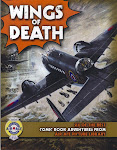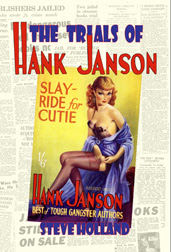Mick Anglo, best known as the creator of Marvelman, Britain's most infamous superhero, died on 31 October at the age of 95.
Born Maurice Anglovitz in Aldgate East, London, on 19 June 1916 and educated at the Central Foundation School, Anglo went on to study art at the John Cass School, London. His first professional work was drawing fashion sketches — his family being in the tailoring business — before freelancing in commercial art until 1939. He drew his first cartoons during War service with the Army in 1942; he was a regular contributor to the South East Asia Command newspaper and its cartoon collection spin-off Laugh with SEAC.
Upon demobilisation he went into advertising agency work, and became an author for Martin & Reid, writing westerns and gangster novels under his own name and the pseudonym Johnny Dekker. He illustrated the cover to one of his own novels, and the publishers suggested he try strips for their line of comics. Anglo opened a studio in Gower Street, London, and the Gower Studios imprint appeared on many of the independent comics of the time, Anglo being responsible for editing Happy Yank 1-3 (Rayburn, 1948), numerous titles for Martin & Reid, including Jolly Western 5-9 (c1948), Merry-Go-Round 13-14 (1949), Cartoon Capers Comic (1949), The Comic Ledger (1949), The Funfair Comic (1949), The Funstar Comic (1949), Kit Marain (1949), The Lariat (1949), Mick Martin (1949), The Rancher (1949), Rangeland Western (1949), Squibs Fun Comic (1949), Captain Zenith (1950), Power Comic (1950), The Outpost Adventure Comic (1950), The Windjammer (1950); other clients include The Sheriff & Elmo’s Own 2-5 (1949-50) for Screen Stories, and The Pioneer Western Comic (1950) for Wyndham.
Amongst Anglo’s clients were Leonard Miller & Son and Arnold Book Co. (published by Arnold Miller), for whom Anglo took over a number of established American reprints, as well as creating new aerial adventure and science fiction comics such as Ace Malloy (1952), Space Comics, Space Commander Kerry and Space Commando Comic (all launched 1953). In 1954 Miller's Captain Marvel reprint was forced to cease publication (because of his similarity to Superman) and Miller asked Anglo if he had any ideas on how to continue the popular series. Anglo achieved this by a deft change of name to Marvelman, continuing the line of comics without a break. Marvelman became the most popular British superhero character to appear in the 1950s, appearing in three titles (Marvelman, Young Marvelman, Marvelman Family) alongside his companions Young Marvelman and Kid Marvelman. Marvelman Family folded in November 1959 and the two other titles switched to reprints in 1960, staggering on until 1963.
The Gower Studios employed a great many artists, amongst them Don Lawrence, Roy Parker, Colin Page, John Whitlock. Frank Daniels, George Parlett, Leo Rawlings, Charles Baker, Denis Gifford, Peter Ford, Roy Castle, etc.
As ‘Anglo Features’ he produced — mostly reusing redrawn old material — Captain Miracle, Battle and TV Features in 1960-61, before producing new stories for Thorpe & Porter’s Classics Illustrated line (1962-63), later producing three TV related comics for the same firm: The Avengers, Charles Rand, and Danger Man.
Since then Anglo has been involved in various other editorial and publishing ventures, including the editing of TV Tornado for City Magazines (1967-68) and Super DC for Top Sellers (1969-70). He later edited Look and Cook magazine. Anglo also compiled several cookbooks, wrote various titles looking back nostagically to the past, a history of penny dreadfuls and WWII army newspapers and ghosted Just Like That for Tommy Cooper. In the late 1970s and early 1980s, Anglo was still working as an artist, drawing features for Battle Picture Weekly and issues of Battle Picture Library. He then switched to writing and drawing issues for D.C. Thomson's Commando before retiring from comics in 1985.
In 1982, Marvelman was relaunched in the pages of Warrior, with Anglo receiving payments for the use of the character and reprints. Marvelman then became embroiled in a lengthy and heated dispute over rights that took place mostly in the USA. The situation was (at least partly) resolved in 2007 when Anglo sold what rights in the character were believed to be his; these were then sold to Marvel Comics who, in 2009, announced a series of reprints of old Marvelman strips, which appeared as Marvelman Family's Finest in 2010 alongside a hardcover collection, Marvelman Classic.
Mick is survived by his wife, Minnie (nee Cedar), whom he married in 1940, and a son.
(* My thanks to Derek Wilson for the photograph, which shows Mick in his heyday in the 1950s.)
Subscribe to:
Post Comments (Atom)



























































Thanks for that, Steve. A real link with the past has now gone.
ReplyDelete